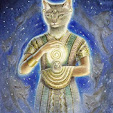Richard Wagner, TRISTAN UND ISOLDE
Cast
YOUNG SAILOR.............................Ji-Min Park (Jette Parker Principal)
ISOLDE...........................................Nina Stemme
BRANGAENE................................Sophie Koch
KURWENAL..................................Michael Volle
TRISTAN........................................Ben Heppner
MELOT...........................................Richard Berkeley-Steele
KING MARKE..............................John Tomlinson (29 Sept, 2, 5 Oct)
Matti Salminen (9, 15, 18 mat Oct)
SHEPHERD...............................Ryland Davies
STEERSMAN............................Dawid Kimberg (Jette Parker Young Artist)
Chorus and orchestra of the Royal Opera House, Covent Garden
CONDUCTOR........................................Antonio Pappano
DIRECTOR.............................................Christof Loy
I absolutely LOVED this peformance, including the staging....of which more later, since it has proved so controversial....but I will discuss the music first! (That's what I went for....the staging was an added bonus).
Right, the production....yes, it IS very sparse, austere, almost minimalist, and this is what I loved about it. I wasn't expecting to like it quite so much, although I did like Loy's LULU as well. What he did in LULU he has done again in TRISTAN, stripped it to its essentials so that the audience can concentrate on the text and the music, which was Wagner's point. After all, nothing 'happens' in TRISTAN, in the sense of stage business, it is nearly all narrative, as in Greek tragedy.
Behind the curtain that covers the back of the stage there is a dining room, so they are not really on a ship (although some irreverent souls suggested that it reminded them of the dining room on the TITANIC).
The drama unfolds in front of the curtain. Isolde (Nina Stemme) comes in front of the curtain wearing a white dress (possibly a wedding dress....some it has been suggested that the dining room represents the wedding breakfast of Marke and Isolde). She changes into a black dress for her confrontation with Tristan.
She is joined by Brangaene (Sophie Koch).
There is a striking contrast between the soaring soprano of Nina Stemme and the burnished mezzo of Sophie Koch....Stemme brings such passion and conviction to the role, as well as beauty of tone and soaring high notes; a really exciting, convincing portrayal of Isolde's confusion and desperation, her unwillingness to admit that she doesn't hate Tristan, she loves him. The Brangaene of Sophie Koch is an ideal foil to Stemme's Isolde.
There is one chair, on which sometimes Isolde sits, sometimes Brangaene....one of the fascinating pieces of stage business (with ONE CHAIR, and an almost bare stage!) is that when Kurwenal (Michael Volle) comes to summon them to land, he sits on the chair, stretches his legs out and puts his hands in his pocket....showing his dislike for Isolde even in body-language. He has a stong, ringing baritone, plays Kurwenal as a straightforward character, perhaps with a military background.Ben Heppner, unfortunately, could not quite match Nina Stemme's achievement, his voice tended to crack rather alarmingly on the high notes.
But he recovered at the end of Act II, and sang "Wohin nun Tristan scheidet, willst du, Isolde, ihm folgen?" with beautiful serenity. And at this point, Kurwenal starts to shiver and pulls his jacket close, as if he is slowly realising....this isn't just rhetoric, he really means it.
So yes, perhaps he could have been a bit more passionate in the Love Duet, but the orchestra under Pappano was really where the focus was, a very nuanced and sensitive portrayal of....well, it's not passion or love, really, is it, it's obsession. Neither singer was overwhelmed by the orchestra, but the music reached the heights of intensity which Heppner sometimes couldn't quite manage.
It must be admitted that John Tomlinson's voice has developed a noticeable wobble, but I thought in the final analysis this didn't detract from his portrayal of King Marke, torn between grief and anger, not really wanting to take the vengeance that Melot keeps urging on him...in the end it is the grief rather than the anger that gains the upper hand with this tragic figure.
At the end of the act, neither of them having swords, Melot pulls a knife and Tristan runs on to it....
I will just mention, before turning to discussing Act III in general, that perhaps the staging of this could have been better managed, and the fact that at the end of Act III one of the chorus ends up bludgeoning Kurwenal to death was the one flaw in this otherwise excellently staged production...there is really no reason why he shouldn't die off-stage. But this is so minor, really, as the production - the staging, was generally of such a high standard.
Act III is Tristan's act, just as Act I is Isolde's. It is true that Heppner was still a little bit plagued by the cracks in the high notes, but in a way this was almost in character for the dying, hallucinating Tristan. Again the scenery is reduced to a minimum, a chair for Tristan and a table, on which sometimes Kurvenal sits while he is listening to Tristan, trying to make sense of what he is saying...but Tristan isn't really communicating with anyone, except in his mind with Isolde. Heppner achieved a melancholy beauty of tone when Tristan thinks back to his orphaned childhood.....and then Nina Stemme crowned the evening with her passionate, soaring performance of the Liebestod, at the end of which she falls exhausted into the chair......![]()
A final moment of searing tension, again supported with great intensity by the orchestra under Pappano.
I will finish by saying that I found this staging brilliant and inspirational...I literally do not understand why people booed it. I found that it went right to the heart of the drama, supporting and emphasising every nuance of the text and the music.







I really love this review. It seems fair and honest. I reviewed this production as well and would have to say that I almost completely agree with everything you said! You can read my review if you so wish, although it is from a more general-opera perspective as this was actually my first live Wagner experience: http://operagurl.wordpress.com/2009/10/14/wagners-tristan-und-isolde-royal-opera-roh/
ReplyDelete